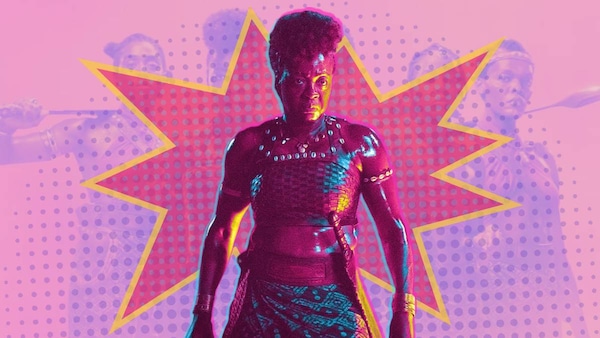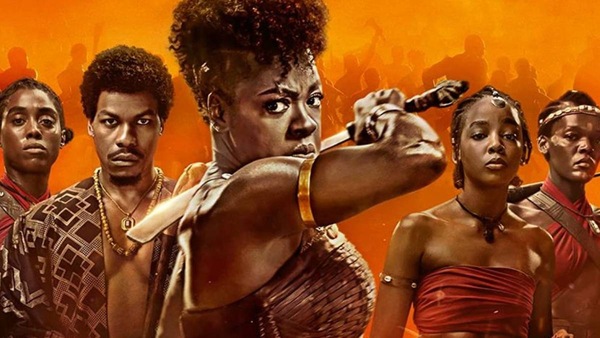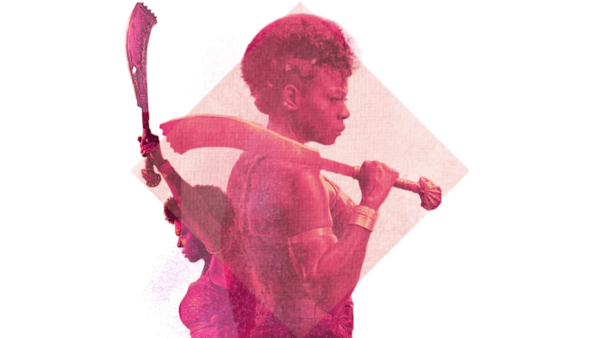The Woman King's Predictability Is What Makes It Poignant
This is #CineFile, where our critic Rahul Desai goes beyond the obvious takes, to dissect movies and shows that are in the news. Here: The Woman King.

In The Woman King, Viola Davis is immense in every way, her face a volcano of pent-up life.
Last Updated: 02.11 PM, Feb 09, 2023
THERE'S NOTHING EXTRAORDINARY about The Woman King, a historical action drama set in the 1820s. It features a proud kingdom, a famous warrior unit, a legendary general, a cocky next-gen protege, and the kingdom’s brave defiance of colonists and slave traders. Been there, done that. But the fact that everything about The Woman King feels so familiar and predictable — its Gladiator-meets-Braveheart tone, the visual aesthetic, the storyline and action, the characters, even the emotional beats — might be this film’s greatest strength. It sounds strange, I’m aware. Yet every time I found myself getting restless while watching this film, I also wondered if perhaps my own cultural and cinematic biases were to blame. Why did I expect “more” from this particular film? Why did I bestow upon it the responsibility to be smarter or subtler than others in the genre? Why couldn’t it be what it chose to be?
If there’s one thing the bloated Marvel superhero franchise has accomplished in the last decade, it’s the mainstreaming of non-white narratives. Some might resent the Hollywood treatment, but I believe it has normalised the average viewer’s relationship with the diversity of the world. It has not only demonopolised the whiteness of the blockbuster landscape but also freed these stories from the pressure of having to be rooted, small, accurate or authentic. Thematic sameness, too, is a language of empowerment. Movies like Black Panther ran so that The Woman King could jog — and jog it does, with the sort of stamina and purpose that reclaims the tropey period drama from the clutches of Caucasian stardom. In terms of source material, the former is the fictional, scaled-up version of the latter. If anything, both use genre formulas to expand the language rather than conform to it.
The Woman King revolves around the West African kingdom of Dahomey, its all-female warrior unit Agojie, their legendary leader General Nanisca (Viola Davis), strong-willed new recruit Nawi (Thuso Mbedu), their mentor-protege friction, and Dahomey’s all-out war with the slave-trading Oyo Empire. Nanisca believes that women are weakened by men — and love; the Agojies must take nun-like oaths and be satisfied with sisterhood. Nawi, though, is rebellious and fiercely opinionated; her budding attraction for a ‘noble’ Brazilian slave trader named Malik is destined to test Nanisca’s theories about love. At this point, Bollywood enthusiasts might claim this sounds like Mohabbatein reimagined as an African historical drama.
The Agojie have their own palace and training ground under King Ghezo, a young man whose wokeness is very much suited to the 1800s. He respects his warriors but also looks at womanhood as an identity of physical binaries — “If she wasn’t so strong, I’d have made her one of my wives,” he jokes. Nanisca is his balancer, though, because the old hand urges him to put his actions where his mouthy feminism is. She convinces him to stop selling their women to Western slave traders — a metaphor for the Hollywoodisation of ethnic history, if there was ever one — and instead sell pine oil to become an African superpower. The King comes around eventually, thus setting Dahomey on a collision course with Oyo after a few Agojies are abducted.

It’s true that the design could have tried harder. I’m not a big subscriber of the speak-your-own-language rule in film (which, I might add, is both a medium of fiction and commercial reach at once), but everyone speaking English in The Woman King takes some getting used to. It’s not the heavy accents — which actually inform the film’s conviction to ‘talk’ in a Western language — so much as the irony of Dahomey being a modern harbinger of African heritage. At one point, it’s hard not to chuckle when King Ghezo demands that a Portuguese-speaking slave trader converse in “my language in my kingdom” only to assert this in English. It’s cheeky, maybe, but also a bit self-defeating. It’s weird to sense that the warriors are struggling to communicate despite the physicality coming so naturally to them. The writing goes overboard with a few stereotypes — like turning the King’s pretty wives into comic-con versions of bitchy Mean Girl characters, or presenting Malik as more of a centerspread model than a conflicted man. (I was often reminded of the music video for Michael Jackson’s ‘Remember the Time’ starring Eddie Murphy). The Nanisca-Nawi equation has more heart than depth, too. Surely, the script could have come up with something better than a birthmark as a plot twist. That sound you hear is the collective groan of Bollywood enthusiasts.

Having said that — and I know this sounds like a cliche — the reason The Woman King really works is because of the performances. Or, more specifically, what the performers bring to the table. Owing to them, the film seldom overplays its themes or cultural novelty. It never goes “Look at us, a film on female warriors” or “see, Africa everywhere!”, because everyone seems to stand out by blending in. They resist the 2022 gaze, casually occupying the environment like it’s any other action film in any other place. Thuso Mbedu looks frighteningly young as Nawi, and this only adds to the character’s sense of dissent. There’s no doubt about Nawi’s skill, but a lot of her chemistry with her seniors is shaped by Mbedu’s investigation of space; she moves with feeling, and feels with physical rhythm.
But the film has no qualms looking like an overdressed spectacle because Viola Davis’ screen-melting intensity defies the norms of what action dramas must look and sound like. The 57-year-old artist plays Nanisca like a character stuck in a modern psychological thriller. Being a warrior, for her, was an escape from being a woman – and yet she finds herself both in awe and shame of her own gender. She walks like a man and strives to rule like one — like someone whose wounds and broken bones have stretched her skin — but her ‘role’ is slowly weakening with the arrival of Nawi.
Davis is immense in every way, her face a volcano of pent-up life, and it’s a shame that the Academy treated the Black Female Leader role as a quota with room for only one. They chose to nominate a Queen (Angela Bassett in Black Panther: Wakanda Forever) in the Supporting Acting category but not a Woman King for Lead Acting. I suppose the snub is part of the film’s basic triumph — it exposes the prejudice of modern moviegoers and their reading of structured gender roles. People interpret the term ‘queen’ as a partner of the king or mother to a prince, but there’s no yardstick for what a ‘woman king’ should act like. Until now. In that sense, Davis is not an actress so much as a woman actor. One might argue that she is so powerful in the film that the next time we use slang like kween and slay, we actually mean woman king and win.
